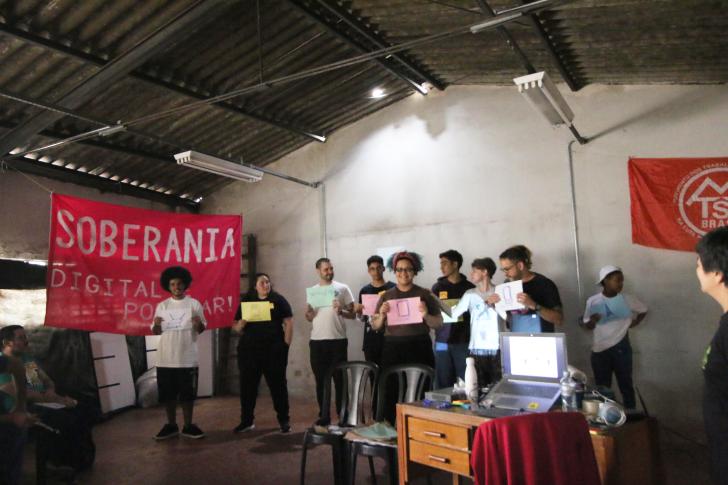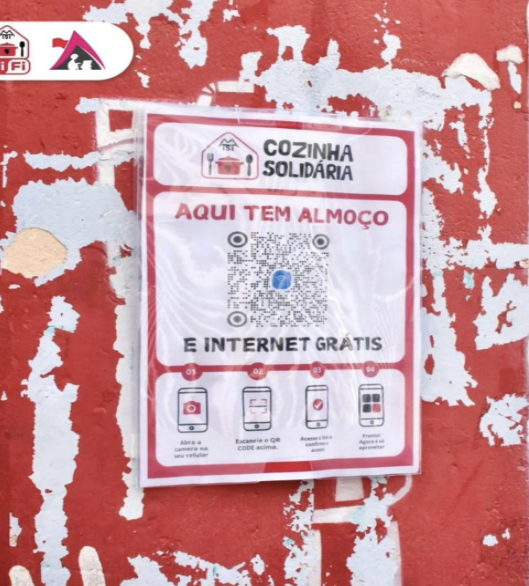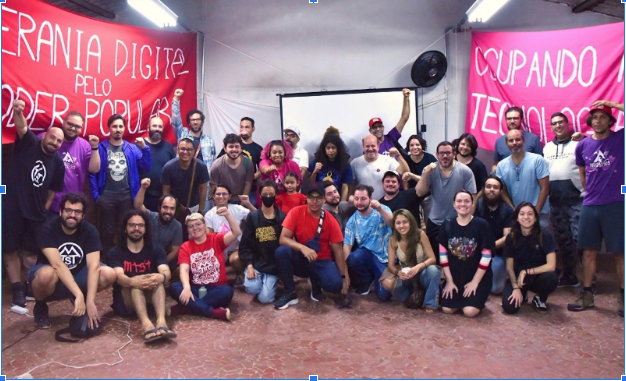
The Movimento dos Trabalhadores Sem Teto (Homeless Workers Movement – MTST) is an urban popular movement that emerged in Brazil in 1997 with the aim of bringing the fight for dignified housing to cities. As technology became a part of daily life and essential for workers, the MTST created the MTST Technology Hub, a space to create “practical alternatives, technologies made by and for the people.” Within the scope of housing policies, there is the need to fight against the dispossession machinery caused by real estate speculation, which pushes the working population to the outskirts of cities. Political disputes involving digital technologies and internet infrastructure are not that different: it is necessary to challenge the monopoly of international companies – big techs – that dominate technology today, and concentrate wealth through the violation of privacy, dissemination of disinformation, violence and hate speech and interference in democratic processes.
In its quest for free, secure technologies to carry out this challenge and promote digital sovereignty, the MTST Technology Hub has developed a series of projects, such as programming courses inspired by the methodology of educator Paulo Freire, in which reading the world comes before reading code; the development of technologies by communities themselves, such as the solutions designed by the Rede Mulheres do Maranhão (Women of Maranhão Network) to solve the problems of small cooperatives; and the Cozinhas Solidárias (Solidarity Kitchens) Wi-Fi project, aimed at meaningful access and community networks in the territories.

The MTST’s Cozinhas Solidárias emerged as a volunteer initiative between 2020 and 2021 in response to the social and health crisis aggravated by the COVID-19 pandemic, offering free meals to combat hunger. At a time when social distancing was an essential measure to contain the spread of the virus, many families in vulnerable situations were unable to adhere to this practice, especially due to the need to seek daily sustenance.
Many of those served also had no access to the internet, limiting the possibilities of communication and participation in the kitchen’s activities. Thus the initiative to implement a free internet connection in these spaces arose, with the hypothesis that connectivity would expand access opportunities and transform the kitchens into true points of digital support.
Wi-Fi in the Cozinhas Solidárias
The proposal of Wi-Fi in the Cozinhas Solidárias began modestly with the installation of internet hotspots in some kitchens, allowing visitors to engage in activities that were previously impossible due to a lack of signal. By 2024, the project marked its first anniversary and had expanded to 11 “kitchens” across four Brazilian states.
Most participants had never encountered terms related to the internet, digital sovereignty and community networks. However, the use of a participatory methodology – including group discussions, playful activities, analogies and the use of Portuguese instead of the foreign jargon typical of digital technologies – helped create a welcoming and collaborative environment.
In August 2024, the Local Networks (LocNet) initiative led by APC and Rhizomatica launched a call for microgrant projects for partner organisations and community networks, with the aim of supporting initiatives for implementation of these networks, training and capacity building, gender inclusion and research on specific demands, and the development of local services. The MTST Technology Hub was included with the proposal to consolidate the work carried out in the Cozinhas Solidárias Wi-Fi project. The objective was to disseminate and consolidate the concept of community networks in autonomous territories and community-based collectives, holding three training workshops in São Paulo based on the needs of participants and practical network-building activities.
Workshops facilitated by women
MariaLab, a feminist organisation that works on digital security and care, was a partner in this initiative and essential to the success of the workshops, by facilitating experience sharing and collective knowledge development. The inclusion of women as mentors in the activities brought new perspectives and creative solutions for the use of networks, and motivated the participation and interest of women in the collectives, who might otherwise have felt embarrassed or insecure about getting involved in the discussions.
The first workshop, on 1 February 2025, covered topics such as technology monopolies, geopolitics and digital sovereignty, the use of secure tools (such as instant messaging apps and VPNs) and the journey of a message to a recipient’s phone.
The second workshop, on 15 February, focused on the theory of cabling and logical network configuration, practical activities with crimpers and pliers, instructions on RJ45 cables, connector installation and router configuration on laptops.
In the last workshop, on 22 February, MariaLab presented the tools developed by the collective and included the construction of a prototype of a local network, a community fibre optic provider, using the network cables and routers configured in class 02 (in addition to a Mikrotik device with DHCP, captive portal and logging).
A total of 40 participants registered via the form available on social media, with an average of 25 participants in each workshop, alongside nine MTST volunteers.
Since a community network cannot be developed, nor digital sovereignty achieved, within the scope of a single project and in the space of three workshops, the MTST Technology Hub now seeks to expand local networks to more territories, together with the workshop participants.

The idea is to incorporate the technical knowledge explored previously and to continue collaboration with technology collectives such as MariaLab, which applies an intersectional feminist approach to technology. It is common knowledge that in a city as vast as São Paulo, which faces heavy rains, it is difficult to mobilise participants to go to outlying territories. Additionally, content such as network maintenance and sustainability has yet to be covered. Moving forward, the MTST Technology Hub aims to keep deepening its knowledge in order to implement community networks with high-quality internet based on fibre optics, in autonomous territories and in housing complexes resulting from occupation movements, building new possibilities and people-centred cities and technologies.
Fábio Neves is a technology worker specialising in software development. He has contributed to technological development across companies, social movements and non-profit institutions. His work is dedicated to creating solutions that promote technological sovereignty, with a focus on accessibility, decentralisation and community autonomy. He actively participates in the building and maintenance of community networks, advocating for democratic access to the internet and critical use of technologies. He sees technology as a tool for collective change and believes in the power of grassroots organisation to confront digital and social inequalities. For him, technology, rights, human dignity, inclusion and collective processes are deeply interconnected, and it is within these connections that he builds his path.
Criz is an activist and researcher focused on internet access and digital rights, who co-coordinated the microgrants project of the Local Networks initiative (LocNet) in Brazil and Indonesia between October 2024 and May 2025.
Photos: Courtesy of the MTST Technology Hub
The experience shared in this blog was supported by the Local Networks (LocNet) initiative through a cycle of microgrants made available via a closed call to the initiative's partners and community networks in Brazil, Indonesia, Kenya and South Africa. Learn more about the call here.